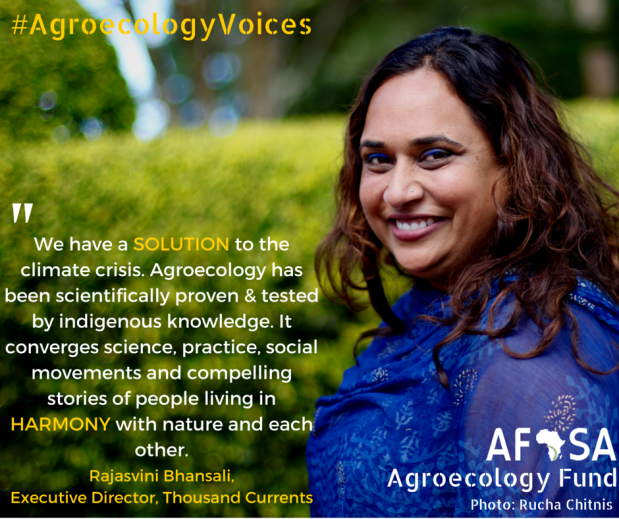Blog and Photos: Rucha Chitnis
Last month, the AgroEcology Fund in partnership with the Alliance for Food Sovereignty in Africa, hosted a convening with over 70 delegates from 20 countries in Masaka, Uganda. Farmers, social movements, funders, scientists and policy advocates dialogued on amplifying agroecological solutions in the context of a changing climate, land grabs and corporate control of seeds.
Here are 7 powerful takeaways of #AgroecologyVoices in Masaka:
1. Respect is a Core Value of Agroecology: Bridget Mugambe of Alliance for Food Sovereignty in Africa summed up respect as the core value of agroecology. In a dominant food paradigm, where the knowledge systems, food culture and ecology of communities is eroded, Bridget reminded us that cultural competency and respect were the foundation of agroecology.

2. Agroecology Defends the Sacred: At the opening ceremony of the agroecology convening, Maria Estela Barco Huerta, General Coordinator of Social and Economic Development of Indigenous Mexicans (DESMI), reminded us on the sacredness of corn to indigenous communities in Mexico. She emphasized how the deep spiritual, cultural and social implications of corn were inherently linked to the identity of indigenous peoples in the Chiapas.

3. Philanthropy Must Wake Up and Smell the Rotten Food System: Funders at the convening recognized that disproportionate amount of financial resources were accelerating a food system that was degrading the soil, environment and leading communities down a path of dependency, debt and livelihood insecurity. The Agroecology Fund is a pooled fund of 14 donors, who recognize that collaboration in philanthropy is vital to amplify sustainable alternatives that are promoted and innovated by small food producers, farmer networks and social movements.

4. Global Food System is Accelerating Climate Change: Scientists and policy advocates in the convening pointed out that the global food system is a major contributor of climate change. “We don’t need carbon markets or techno-fixes. We need the right policies and programs to dump the current industrial food system and create a sustainable, equitable and truly productive one instead,” notes GRAIN, an organization that promotes community -controlled and biodiversity-based food systems.

5. Women Farmers Are the Solution: The convening had a rich representation of women, who were farmers and frontline organizers in robust social movements from South Korea to Mexico to Nigeria. They recognized the centrality of women farmers in promoting the food security and health of their families and communities. Women’s groups also brought attention to the feminization of agriculture and the power of women’s groups and networks to amplify sustainable food systems.

6. Indigenous Knowledge is Scientific: Social movements, like Via Campesina, emphasized the power of indigenous knowledge systems to amplify agroecology. The wisdom, experience and ingenuity of local communities is often rooted in ancestral knowledge that is passed down from one generation to the next. The convening demonstrated the rich complimentary relationship between indigenous knowledge and science in promoting agroecology as a way forward to mitigate hunger and climate change.

7. Resourcing Grassroots Solutions is Key for Mitigating Hunger: There was resounding consensus that the old school style of top-down development would not flower a people-centered agroecological movement. Jennifer Astone, Executive Director of Swift Foundation, emphasized that Swift Foundation was funding agroecology as a key strategy to combat climate change and hunger. “At its heart agroecology is about biodiversity and healthy families and communities. It’s about supporting small farmers to continue their successful agricultural practices that also protect the environment,” she said.


These memes are scheduled for posting each Monday at http://www.facebook.com/gsowebsite.
Thank you.
LikeLike
Thank you!
LikeLike